International Women’s Day celebrates the social, economic, cultural and political achievements of women across the globe.
This year’s celebration is also an opportunity to recognise the impact that women have been having during the pandemic, including those on the frontline in the fight against COVID-19.
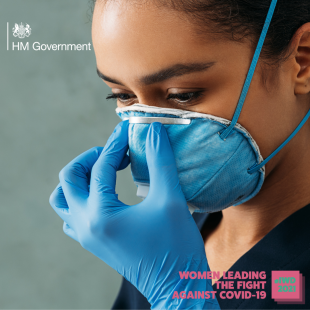
Women on the frontline
Women have played a key role in the national effort – 78% of jobs in the health and social work sector are held by women. There is so much amazing work happening in fields such as healthcare, social work, education, research and so much more, and women have been heavily involved in both testing and vaccine solutions.
As we recover from the pandemic it’s so important that we all receive the vaccine when it’s offered to us. Some women have expressed worries about having the vaccine due to concerns around future pregnancies, but the Royal College of Obstetricians and Gynaecologists have noted that vaccines would not cause any impact on women’s fertility. This is a highly infectious disease and we must do all we can to keep ourselves and our loved ones safe.
This International Women’s Day, I urge you to join me in showing our gratitude to all the extraordinary women who are helping us in the fight against COVID-19. There are countless doctors, nurses and other frontline workers who have been working flat out to help as many people as possible.
We celebrate women like Professor Sarah Gilbert, who designed the Oxford vaccine that is giving us so much safety and hope. We also celebrate thousands of other women working behind the scenes day-in-day-out to care for others as we fight this pandemic.
Meet the women on the frontline:
Jennifer Thomas, Occupational Therapist
During the first wave, I was redeployed for four months to medical rehab wards to support COVID-19 patients.
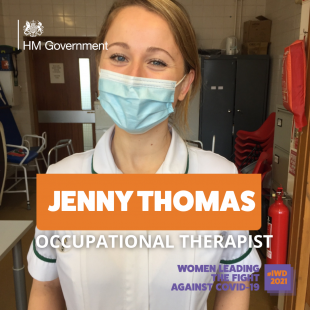
My role is normally about empowering individuals to be as independent as possible, but with reduced capacity my job quickly became about supporting patients with the fundamentals of care: washing and dressing, toileting, feeding and repositioning. I caught COVID-19 early on and had to self-isolate for two weeks.
Despite COVID fatigue and guidelines and policies changing quickly, we got to experience the very best of people. I was so grateful for the other occupational therapists, physios and nursing staff who were also redeployed – we became a supportive bunch, and patients and relatives showed amazing resilience.
The way we work in occupational therapy has changed drastically to prevent the spread of COVID-19 to our vulnerable patients. We normally do a lot of work in the community and patients’ homes, like supporting relatives, and run different kinds of groups. We’ve worked creatively to adapt and ensure that patients don’t miss out.
I’m currently working in a neuro rehab unit where I support patients to regain functional skills lost through brain injury. I get to see something amazing every day, whether it be someone learning to wash themselves again, take a few steps, say some meaningful words or propel themselves in a new wheelchair! We’ve used secure virtual meetings wherever possible so families can see their relatives’ progress.
I’ve now had both vaccine doses and couldn’t be more grateful. I would urge everyone to have the vaccine when offered, so life can get back to normal.
For me, it’ll be wonderful when I can focus all my work energy into rehabilitation rather than worrying about a virus, and – personally – I can’t wait to rearrange my wedding and hug family! If you’re unsure whether to have the vaccine, please remember it’s been developed by world-leading scientists, and is the only realistic way out of this unbelievable challenge.
Grace Groves, Midwife
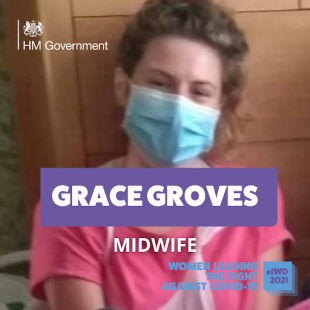 I’ve been working in hospital and community settings since the start of the pandemic, during which there’s been a real sense of fear amongst the people we’ve been caring for.
I’ve been working in hospital and community settings since the start of the pandemic, during which there’s been a real sense of fear amongst the people we’ve been caring for.
As midwives, we were swamped with new information, from changes to schedules of care to how to correctly put on and remove PPE. It was exhausting and frightening, but I felt I had to do my best not to pass on my fears to those in my care. I wanted them to feel as though the situation was under control, and do what I could to support them to still have positive experiences of pregnancy and birth.
Not long after the pandemic started, a woman who I’d looked after throughout her pregnancy told me she didn’t want me to come and check on her and her baby at home. It was a completely justified response, but I remember breaking down in tears when I got off the phone to her. I’d never encountered such a situation before, and it was a stark reminder that the pandemic was changing everything we’d previously taken for granted.
More recently, when rates in the South East soared, I felt anxious about my own safety at work for the first time. Now pregnant myself, I found it difficult to hear stories about pregnant women becoming unwell and being taken to ITU. And I found it more challenging to listen to others’ anxieties, as I was constantly worrying about the risks posed to my own unborn baby.
I’d urge everyone to get the vaccine when offered. We all have a role to play in ensuring we can safely return to a more connected society.
Jenny Drage, Speech and Language Therapist
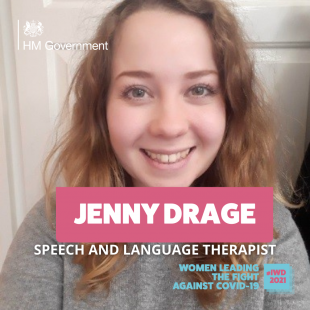
I’ve been working as a Speech and Language Therapist (SLT) with adults with a Learning Disability in the community for just over four years. The last year has been quite different indeed! My whole way of working has completely changed – from visiting people in their houses or in the community, to being mostly stuck behind a desk.
As an SLT I help people with their communication, eating, drinking and swallowing problems (Dysphagia), which have been extremely challenging to do via technology. As the client group I work with are so vulnerable, face-to-face visits have been limited to essential visits only, where we have had to carefully weigh up potential risks of passing on COVID-19, to the consequences of not completing the visit.
This has meant that I’ve been predominantly completing assessments and sessions virtually, which has taken a lot of time to adapt to. Many of the clients I support find it difficult or are unable to engage with technology as a meaningful form of communication, so we’ve had to get creative!
I’ve always been lucky enough to be surrounded by some very skilled, remarkable women. The strength, resilience, adaption, compassion and support from my team over this challenging time has kept us all going.
I’ve now received both vaccine doses and thankfully people with a learning disability are being recognised as a priority for the vaccine. It’s so great to hear from family and friends as they have had or are going to receive their vaccine. It finally feels like we’re on our way to a bit more ‘normality.’ I certainly cannot wait to get back out into the community!
Sophia Woodward, Physiotherapist
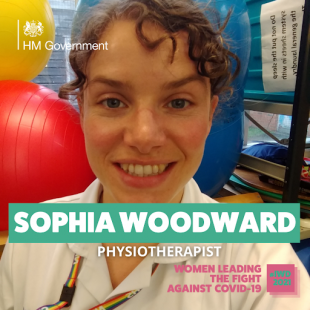 I’m an NHS physiotherapist specialising in neuro-physiotherapy in hospitals, outpatient clinics and in the community. I work with a wide variety of patients who have neurological conditions such as Parkinson's, Multiple Sclerosis, brain or spinal injuries.
I’m an NHS physiotherapist specialising in neuro-physiotherapy in hospitals, outpatient clinics and in the community. I work with a wide variety of patients who have neurological conditions such as Parkinson's, Multiple Sclerosis, brain or spinal injuries.
COVID-19 has affected my daily life like everyone else, but professionally it’s also had a big impact. During the first wave I was working in a large hospital with people who were acutely unwell and also with outpatients. I was quickly unable to see any of my outpatients face-to-face since they were vulnerable, and I began working on newly created Covid wards.
It was a pretty stressful period as the situation was changing rapidly, but I felt very grateful to be working with a supportive team. Physiotherapy is a collaborative profession, but during those months the team felt even more important. We really bonded, laughed and cried together most days beneath our PPE.
I’ve seen the impact of Covid on my patients and their relatives, not just those who have been very unwell with the virus, but also the side effects of not being able to see people face-to-face. I'm proud we’ve been able to facilitate video calls and have socially distanced exercise groups with patients to boost moods, but I'm also aware that what they really want is to hug their loved ones.
The day my first patient was vaccinated I breathed a sigh of relief, and when I received the vaccination myself I felt a little of the tension between my shoulder blades ease.
International Women's Day makes me reflect on the brilliant career that is physiotherapy! I work with a great variety of strong people, but there is something wonderful about seeing women at the top of my field who are excellent in their profession, and have also had families and adventures outside of it. It makes me feel that no doors are closed to me.
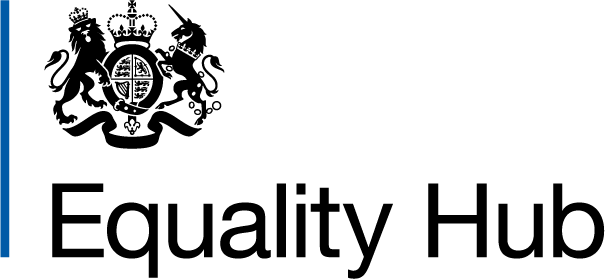
Recent Comments